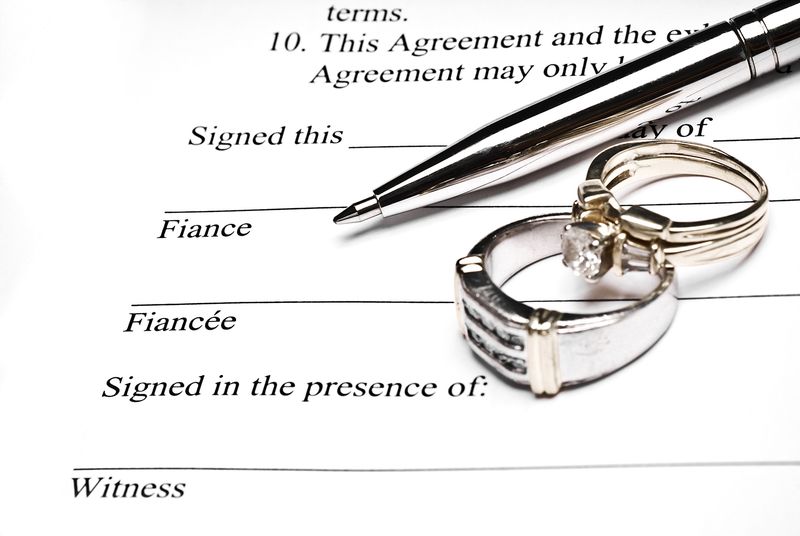Divorcing Trouble? 15 Warning Signs You’re Marrying Someone Who’ll Be A Divorce Nightmare
Marriage can be a beautiful union, but it’s essential to consider the long-term implications of certain behaviors that might seem harmless during the engagement. These habits and tendencies, if ignored, could lead to a tumultuous divorce.
In this blog post, we’ll explore 15 warning signs that the person you’re about to marry might turn into a divorce nightmare. Pay close attention now, and you might save yourself a world of trouble later.
1. They need to win every argument

Is every disagreement a battle that your partner simply must win? While some people thrive on debate, others may use it as a way to exert control. Their need to win at all costs can erode trust and respect.
In a marriage, this can translate into an unwillingness to compromise. If one person always has to be right, the other may feel belittled or undervalued. This dynamic can lead to resentment, making the marriage fragile.
Over time, the persistent need to dominate arguments can transform manageable conflicts into insurmountable obstacles. If your partner’s argument style leaves you feeling defeated rather than understood, take it as a warning.
2. They talk badly about all their exes

Ever noticed how your partner talks about their past relationships? If every ex is a villain, it might indicate a lack of self-awareness or responsibility. This tendency could point to an inability to reflect on their own role in past conflicts.
Badmouthing exes might seem trivial, but it may also signal how they’ll talk about you. In a divorce scenario, this can escalate into public disputes that can tarnish reputations.
Consider how they frame past failures and how they might handle future disagreements. If your partner can’t reflect positively on their past, it may be a sign of trouble ahead.
3. Money is a power move, not a shared plan

How does your partner handle finances? If money is wielded as a tool to control rather than a shared resource, it can lead to imbalances. Such behavior often manifests in dictating spending or withholding financial information.
When marriage turns into a power struggle over finances, it fosters inequality. This imbalance can become a source of major conflict, especially during a divorce when assets and responsibilities are divided.
Financial control can create dependency and resentment. If your partner uses money to dominate rather than collaborate, it may foreshadow future disputes that are hard to resolve.
4. They guilt you into staying quiet

Does your partner often make you feel guilty for voicing concerns? Using guilt to silence you can be a subtle form of control, creating a dynamic where one partner’s voice is consistently diminished.
This can lead to a relationship where honest communication is stifled. Over time, resentment builds as one person’s needs and opinions are continuously suppressed. This toxic cycle can become deeply ingrained.
When disagreements arise, feeling unable to speak up can lead to emotional distance and unresolved issues. If you’re often guilted into silence, it may signal potential challenges in future disagreements.
5. They’re always keeping score

Is your partner tallying every favor, misstep, or argument? Keeping score can poison a relationship, making it transactional rather than supportive. This habit turns every interaction into a competition.
In marriage, this behavior breeds resentment and fosters an environment of mistrust. It signals a lack of genuine partnership and willingness to work towards common goals.
When conflicts arise, scorekeeping can lead to petty arguments and a lack of resolution. If your partner is more focused on one-upping than understanding, it’s a red flag for future discord.
6. Compromise isn’t in their vocabulary

Does compromise feel like a foreign concept to your partner? In a relationship, flexibility is key. Without it, minor disagreements can snowball into unmanageable disputes.
The absence of compromise suggests an inability to empathize or appreciate different perspectives. This rigidity can cause significant friction over time, leading to alienation.
Marriage requires negotiation and adaptability. If your partner is unwilling to meet you halfway, it may indicate future challenges in resolving conflicts amicably. Consider this a potential precursor to more serious issues.
7. They make decisions without you

Does your partner often make significant decisions without consulting you? In a healthy relationship, both partners should feel involved in major life choices.
Making unilateral decisions can reflect an imbalance of power and a lack of respect for your input. Over time, this can lead to feelings of marginalization and frustration.
As life’s challenges arise, the habit of excluding you from decisions can create serious discord. If you’re often left out of the loop, it may be a sign of future relationship strife.
8. Their friends and family raise red flags—loudly

Have friends or family expressed concerns about your partner? Sometimes, those close to us see red flags that we might overlook.
While it’s important to form your own opinions, consistently negative feedback from trusted loved ones shouldn’t be ignored. They may notice behaviors or patterns that you’re too close to see.
Such warnings can be indicators of deeper issues that might become pronounced in marriage. If everyone seems worried, it’s worth considering their perspective and reevaluating your relationship.
9. They weaponize affection when things don’t go their way

Does your partner withhold affection when upset? Using love and affection as a bargaining tool can create emotional instability and insecurity.
This manipulation can lead to a relationship where affection is conditional, fostering an environment of anxiety and doubt. Over time, this dynamic can erode trust and emotional intimacy.
In marriage, reliance on conditional affection can make resolving conflicts more difficult. If affection feels like a tool for control, it may indicate potential problems in maintaining a healthy, balanced relationship.
10. You feel like you’re walking on eggshells

Fare you often find yourself overly cautious around your partner to avoid conflicts? Feeling like you’re walking on eggshells can signify an underlying tension and fear.
This environment can prevent open communication and lead to emotional withdrawal. When you can’t express yourself freely, resentment and distance grow.
Marriage should offer a safe space for both partners. If you’re constantly worried about triggering a negative reaction, it may point to a future filled with unresolved conflicts and misunderstandings.
11. They joke about leaving when things get tough

Does your partner casually joke about leaving during tough times? Humor can be a defense mechanism, but joking about abandonment can reveal deeper insecurities.
This behavior might seem harmless, but it can undermine the stability and commitment needed in marriage. It can cause lingering doubts about their dedication to the relationship.
When challenges arise, the fear of abandonment can exacerbate conflicts. If jokes about leaving make you uneasy, it’s worth exploring the underlying sentiment and addressing it openly.
12. They push for control over your time, money, or choices

Does your partner try to control your time, finances, or decisions? This behavior often stems from insecurity and can lead to a restrictive relationship.
Over time, being controlled can breed resentment and stifle personal growth. Relationships thrive on mutual respect and autonomy, not dominance.
If you’re being pressured to conform to your partner’s will, it might signal more significant issues down the road. This dynamic can transform into a power struggle that’s difficult to escape from in marriage.
13. Apologies feel hollow—or never happen

Are apologies from your partner rare or insincere? A lack of genuine remorse can indicate emotional immaturity and an inability to take responsibility.
Without accountability, conflicts remain unresolved, and emotional wounds fester. A sincere apology can heal and strengthen relationships, but hollow ones do more harm than good.
In marriage, the absence of meaningful apologies can create a cycle of blame and bitterness. If your partner’s apologies feel empty or non-existent, it’s a warning sign for future relational health.
14. They threaten legal action before you’re even married

Has your partner ever threatened legal action, like prenups or custody, before tying the knot? Such discussions can signal distrust and a focus on future conflict.
While legal considerations can be practical, using them as threats indicates underlying mistrust and a lack of faith in the relationship’s longevity.
This mentality can set a tone of suspicion and division, foreshadowing future legal battles. If threats of legal action are present before marriage, it may predict a contentious relationship ahead.
15. They downplay how hard divorce can actually be

Does your partner make light of the complexities of divorce? Underestimating the emotional and logistical difficulties can reveal a lack of maturity and insight.
This cavalier attitude might suggest an unwillingness to acknowledge serious relationship challenges. It could mean your partner isn’t prepared to put in the hard work needed to maintain a marriage.
If divorce is brushed off as an easy solution, it might indicate a readiness to walk away rather than resolve issues. Take this as a potential sign of future instability.







